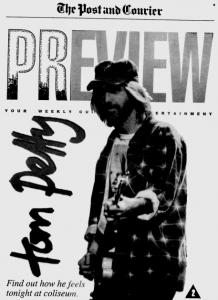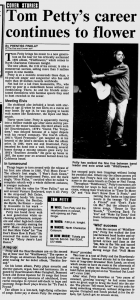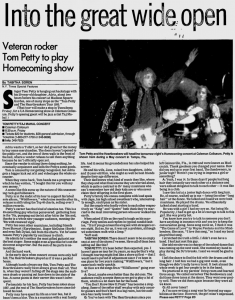Tom Petty's career continues to flower
By Prentiss Findlay
Charleston Post & Courier - Thursday, September 28, 1995
Tom Petty brings his music to a new generation on the tour for his critically acclaimed 1995 album, "Wildflowers," which comes to North Charleston Coliseum tonight.
Thew new album, the 11th of his career, is also a commercial success, selling more than 3 million copies in nine months.
Petty is at a mid-life crossroads these days, a 44-year-old singer and songwriter who has sold more than 40 million record worldwide.
Not bad for a kid from Gainesville, Fla., who grew up poor in a cinderblock house without air conditioning. There, he and his friends entertained themselves with bamboo spears they used to hunt crawfish in the sewer.
Meeting Elvis
His childhood also included a brush with stardom at age 12 when he met Elvis on a movie set near home. By age 14, he was playing in bands with names like Sundowner, the Epics and Mudcrutch.
Thirty years later, Petty is apparently moving into a mellow middle age after some stormy passages in the music business. His third album with the Heartbreakers, 1979's "Damn the Torpedoes," was delayed because of a legal dispute with his record company. The fourth album, 1981's "Hard Promises," got tangled up in his boycott of the label's decision to hike the album price. In 1984, worn out and frustrated, Petty smashed his band into a wall, breaking several bones during a mixing session gone awry for 1985's "Southern Accents." He gave up booze in 1987, the same year an arsonist burned down his California house.
In turnaround
Things began to turn around with the release of his first solo album in 1989, "Full Moon Fever." The album's first single, "I Won't Back Down," epitomized the transformed Petty, and the third single, "Free Fallin'," certified what he called "a complete rebirth with a whole different audience, a younger audience."
Some think the video for "Free Fallin'," set on and around Ventura Boulevard, says it all: Petty is the strip-mall Bob Dylan, translating heady '60s icons such as Dylan, the Beatles, the Byrds, the Stones -- ready traceable in his work -- down to a younger generation.
Petty has found favor with a new generation while eschewing synthesizers, computers and other high-tech studio wizardry, recently snaring the MTV Music Awards honors for Best Male Video for "You Don't Know How It Feels." He received the same honor in 1994 for "Mary Jane's Last Dance."
A leg up
Petty and the Heartbreakers are on the second leg of their tour for "Wildflowers." The opener is Pete Droge, an American Record artist from Seattle touring for his debut album, "Necktie Second."
On his latest album, Petty plays acoustic and electric guitars, organ, bass and harmonica. He is joined by Heartbreakers Mike Campbell, Benmont Tench and Howie Epstein for 15 songs that focus on the conflicting emotions of adulthood, from rueful nostalgia to cynical self-doubt to hope and yearning. Ringo Starr plays drums for "To Find A Friend."
The album is a low-tech, high-flying collection of songs. Some say it shows Petty the songwriter has escaped pop's teen trappings without losing his youthful zest. Other say the album proves yet again that Petty's fans are right to mention his name in the same breath as Dylan or Neil Young.
Throughout "Wildflowers," Petty's narrators are searching for ways to bust out of their mid-life crisis, venting their frustration in "Time to Move On" and "You Don't Know How It Feels," and turning their backs on long-time lovers in the twangy "To Find A Friend" and "Don't Fade On Me." But the album's last three songs, "House In Thw Woods," "Crawling Back To You" and "Wake Up Time," find them rediscovering their faith in love.
'Wild' success
With the success of "Wildflowers," Petty has walked the fine line between band leader and solo artist. He and the band collected critics and fans in the '70s, fans in the '80s, and turned the corner to the '90s on the strong surge that "Full Moon Fever" provided.
This tour is a test of Petty and the Heartbreakers new lineup. Internal strains led to the departure of long-time drummer Stan Lynch, an event which seems to have its roots in the aftermath of a long spell when the Heartbreakers toured behind Dylan (and played on his "Knocked Out Loaded") circa 1986.
After what Petty describes as "two years of constant, grueling touring," he had come home with no great urge to bring the band into the studio. The phrase "full-moon fever" was his code for doing something whimsical, without obligation to anyone. Campbell and Tench pitched in for the album, but Lynch got no session invite.



